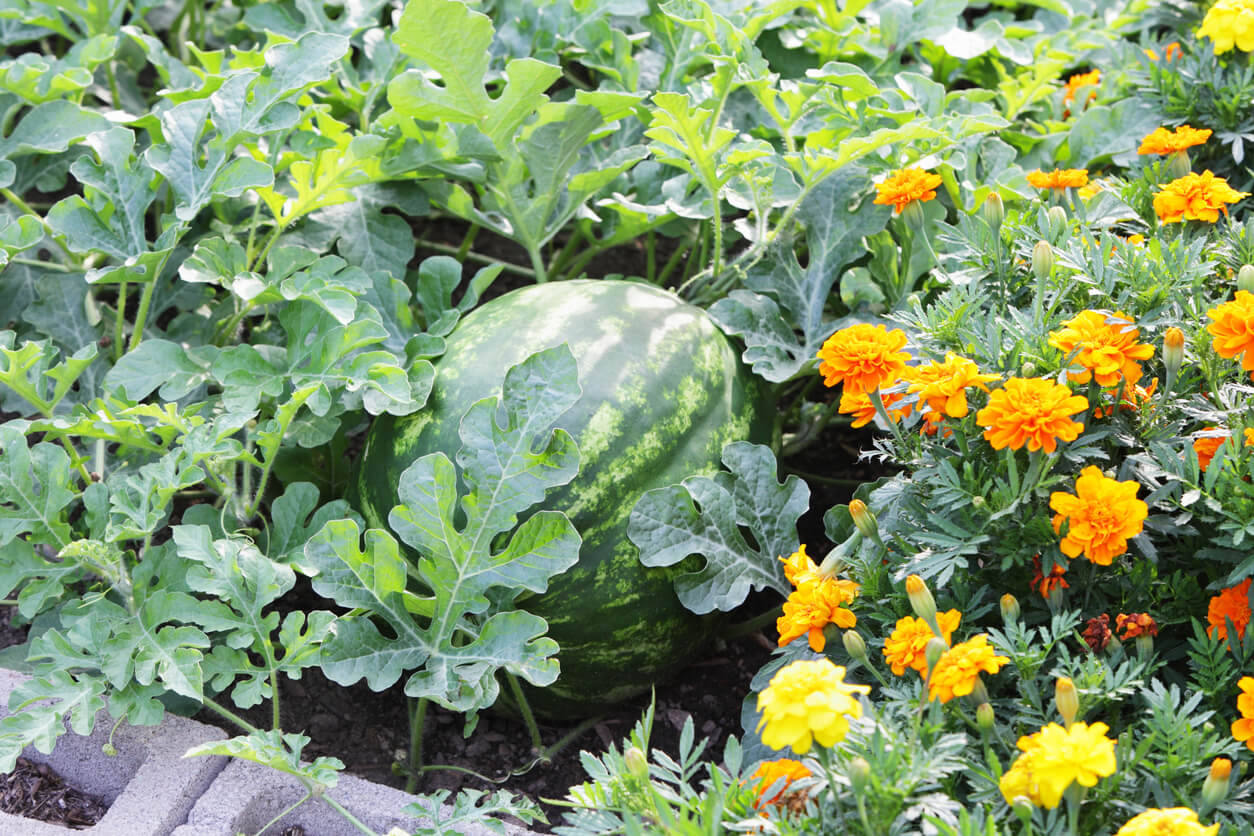
A few years ago, I noticed that my fruit and vegetable garden wasn’t quite thriving as I had hoped. Unpollinated cucumber blossoms here, wimpy squash blossoms there…the plants seemed to lack the enthusiasm I hoped for when I planted them. As I walked through the garden one morning, it struck me that the absence of pollinators might be the missing piece of the puzzle, I even built a bug hotel!
Determined to find a solution, I began researching companion planting and discovered that certain flowers could work wonders in attracting pollinators and deterring pests. Borage, with its delicate blue flowers, emerged as a top contender. Not only did it draw in bees, but it also had the added benefit of keeping unwanted pests at bay. Marigolds, too, with their bright, cheerful blooms, seemed to be a favorite among pollinators while also helping to keep soil-dwelling pests away from my precious vegetables. And it’s true – bunnies won’t even touch my carrots when the bed is lined with Marigolds!
Armed with this knowledge, I carefully selected and planted these floral companions alongside my vegetables. As the weeks passed, I watched in delight as my garden transformed. Bees and butterflies started to appear regularly, flitting from flower to vegetable, carrying precious pollen, and bringing new life to my garden.
The more I observed, the more I realized that these flowers were not only attracting pollinators but also creating a balanced ecosystem within my garden. Beneficial insects, such as ladybugs and lacewings, found shelter among the flowering plants, helping to keep pest populations in check.
As harvest time approached, I marveled at the difference these simple changes had made. My vegetables were healthier, more abundant, and bursting with flavor. It was a a great example of working with nature and creating a space where all the elements could thrive together.
I highly suggest considering incorporating companion flowers to create a beautiful and productive growing space when planning your own vegetable garden! Companion flowers not only add visual appeal but also offer numerous benefits to your vegetables. Here are some excellent flower choices and the reasons why they make great companions in your vegetable garden.
- Marigolds are a classic companion flower for vegetable gardens. They release a strong scent that deters pests like aphids, nematodes, and whiteflies. Marigolds also attract beneficial insects such as hoverflies and ladybugs, which prey on garden pests. Plant marigolds throughout your garden, especially near tomatoes and peppers.
- Nasturtiums are known as trap crops, attracting pests like aphids and whiteflies away from your vegetables. They also improve soil quality by acting as a ground cover, suppressing weeds, and retaining moisture. Nasturtiums’ vibrant flowers add a pop of color to your garden, and their edible leaves and flowers can be used in salads.
- Borage is an excellent companion for tomatoes, squash, and strawberries. Its blue, star-shaped flowers attract pollinators like bees and beneficial predatory insects. Borage also improves soil fertility by adding trace minerals and can be used as a compost activator.
- Calendula, also known as pot marigold, is a versatile companion flower. It attracts beneficial insects, repels pests, and its sticky leaves can trap aphids and whiteflies. Calendula’s bright yellow and orange flowers add a cheerful touch to your garden, and its petals are edible, making them a great addition to salads and garnishes.
- Sweet Alyssum is a low-growing, flowering ground cover that attracts beneficial insects like hoverflies and parasitic wasps. It also provides nectar for pollinators and helps suppress weeds. Plant sweet alyssum near your vegetable crops to create a living mulch and enhance the overall health of your garden.
- Zinnias are not only beautiful but also attract pollinators and beneficial insects to your vegetable garden. They come in a wide range of colors and sizes, making them a versatile choice for any garden design. Zinnias are especially helpful in attracting ladybugs, which feed on aphids and other soft-bodied pests.
By incorporating these companion flowers into your vegetable garden, you can create a thriving ecosystem that benefits your plants, attracts pollinators, and helps manage pests naturally. Not only will your garden be more productive, but it will also be a visually stunning and inviting space for you to enjoy.
Looking back, I’m grateful for the journey that led me to discover the incredible impact of companion planting beyond fruits and vegetables. By welcoming the right flowers into my vegetable garden, I not only found the key to attracting pollinators and deterring pests but also unlocked a deeper appreciation for the intricate web of life that sustains us all.


 Previous
Previous

